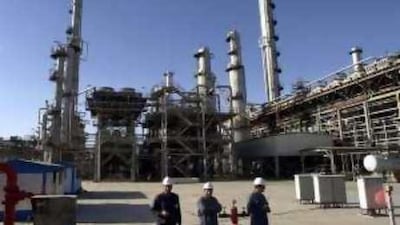The region's petrochemical industry is bracing for a global oversupply of product in the next three years that could trigger a "bloodbath" of losses and consolidations, and a chance for large state-backed firms to grab market share, industry officials said today. Investments in both the Gulf states and East Asia will add millions of tonnes of extra plastics and chemicals capacity in the next several years, leading to a glut on the market. The supply overhang will occur as the world economic downturn slows demand for petrochemical products and a credit crunch makes it harder to secure financing for large projects, executives told a conference in Dubai. The sector faces "an extremely tough market period" from 2009 to 2011, said Roy Vardheim, the chief operating officer for Borouge, the plastics unit of the Abu Dhabi National Oil Company (Adnoc). "It's going to be a bloodbath for the polyolefin industry, and only the best will survive." Spurred by high oil revenues and a need to diversify from crude exports, Saudi Arabia, the UAE, Kuwait and Qatar are spending tens of billions of dollars to build plastics and chemicals facilities in industrial centres such as Jubail, Yanbu and Ruwais. The most immediate challenge was a shortfall in financing for current projects, much of which has come indirectly from US and European banks, said Zahoor Khan, a senior manager at Gulf Investment Corporation who specialises in financing oil and industrial projects. "There isn't enough money," he said. "Large projects will be deferred... smaller projects will get the money, but they have to start showing better economics." Mr Khan estimated that US$111 billion (Dh407.69bn) worth of petrochemicals projects were in development or planned in Saudi Arabia alone, but as of August the country's funds available to the economy stood at $235 billion. In the longer-term, however, regional producers could capitalise on competitors' weaknesses. Many of the region's largest producers, including Borouge and the Saudi Basic Industries Corporation (Sabic), use low-cost ethane gas supplied at a fixed price by state oil firms. Their costs fall in the bottom quartile of producers worldwide, and a tough market environment would present a chance for them to absorb smaller producers or simply boost their market share as high-cost firms failed, said Ahmed Albassam, the director of business development for Tasnee, a Saudi chemicals producer. Mr Albassam said that one of the big regional producers' biggest advantages was that their facilities achieved greater economies of scale than competitors in East Asia and were positioned closer to growth markets than North American producers. He said GCC governments could help ease the strain on the industry by encouraging the development of industries to use plastics domestically, such as a car assembly industry. "A lot has to be done downstream to absorb some of these commodities," he said. Mr Vardheim was confident Borouge would withstand any downturn. "We firmly believe that huge sites like Borouge 1,2 and 3 will redefine the cost structure for manufacturing polyolefins," he said, referring to the company's existing and planned facilities in Ruwais. Their sheer size means the largest producers also have the ability to better weather a profits dip. For example, by 2010 Borouge expects to start production of polypropylene, a durable plastic resin used in specialised plastics, by converting ethylene into propylene. The standard, and cheaper, approach is to buy propylene from a refinery, but it is not available from Adnoc. Mr Vardheim said Borouge was willing to risk lower profits in the medium-term and adopt the unconventional approach to grab a market share in the polypropylene trade. By 2014, the company expects to receive propylene from the expansion of Adnoc's refinery at Ruwais and then enjoy the extra profits. In April, Borouge announced it would conduct a feasibility study for Borouge 3, which would more than double the company's annual production capacity to 4.5 million tonnes. Mr Vardheim said the company had been guaranteed feedstock for the project, and hoped to start front-end engineering and design for the facility next year. cstanton@thenational.ae

Plastic glut of supply in Gulf
The region's petrochemical industry is bracing for a glut of supply over the next three years and a 'bloodbath' of losses.
Most popular today
